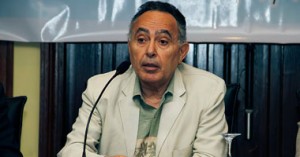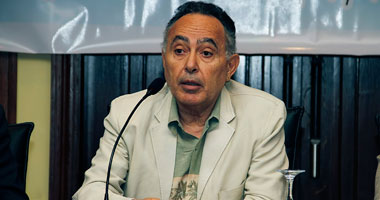 Zeid Raad, the UN high commissioner for human rights met yesterday with Bahey Eldin Hassan, the director of the Cairo Institute for Human Rights Studies (CIHRS), in the OHCHR office in Geneva. The 50-minute meeting was attended by Mona Rishmawi, the chief of the rule of law and democracy unit at the OHCHR, and Hanny Megalli, the head of the Asia, Pacific, and Middle East and North Africa bureau of the OHCHR.
Zeid Raad, the UN high commissioner for human rights met yesterday with Bahey Eldin Hassan, the director of the Cairo Institute for Human Rights Studies (CIHRS), in the OHCHR office in Geneva. The 50-minute meeting was attended by Mona Rishmawi, the chief of the rule of law and democracy unit at the OHCHR, and Hanny Megalli, the head of the Asia, Pacific, and Middle East and North Africa bureau of the OHCHR.
Last week Hassan met with Jeffrey Feltman, the UN under-secretary-general for political affairs, and of his aides at Feltman’s office in New York.
According to Hassan; both meetings addressed the appalling deterioration in the state of human rights in Egypt, unseen for several decades, and the orchestrated security’s legislative and media assault on independent human rights organizations. This campaign seeks to eliminate independent advocacy activity by forcing independent rights advocates to close their organizations, or voluntarily commit suicide by abandoning the Egyptian legal frameworks under which they currently operate and re-register as associations under a different, repressive law, or operate underground or from outside Egypt. Hassan explained that independent human rights groups have not faced such threats since they first emerged 30 years ago, including death threats against rights advocates, open-ended detention, prosecution on fabricated criminal charges, and the closure of their organizations and the confiscation of their assets.
Hassan said that the war on terror is simply a pretext for the systematic, daily repressive measures against young secular activists, non-terrorist Islamists, independent journalists and media figures, and human rights defenders, which explains the ongoing failure to defeat terrorism. Hassan suggested that current government policies indirectly foster terrorism, pushing Egyptians toward desperations and extremism, as a result of the loss of hope in politics, the futility of peaceful, public action, and the lack of faith in the neutrality of judicial institutions. This leaves no options for either Islamists or secularists. These foolish policies thus help to nurture an environment conducive to the recruitment of more Egyptians in terrorist activities, both in and outside Egypt, as well as for acts of violence, retribution, and political revenge. This helps explain the spread of unorganized violence and terrorism of the type seen everyday in Cairo and other cities in the Delta and Upper Egypt, along with organized terrorism in Sinai.
Hassan expressed the hope that the government would reconsider its policies and orientation before Egypt slides into an abyss of unremitting terrorism and political violence, and counter-violence and terrorism, as is the case in Syria, Iraq, and Libya.
In commenting later on the Egyptian government’s announcement that it was inviting the OHCHR to sign an agreement to open a branch office in Egypt, Hassan said that at the current context, the offer is tantamount to a poisoned apple. Hassan said that the UN should not be involved in raising its flag over the grave the government is currently digging for independent human rights organizations in Egypt.
Share this Post

